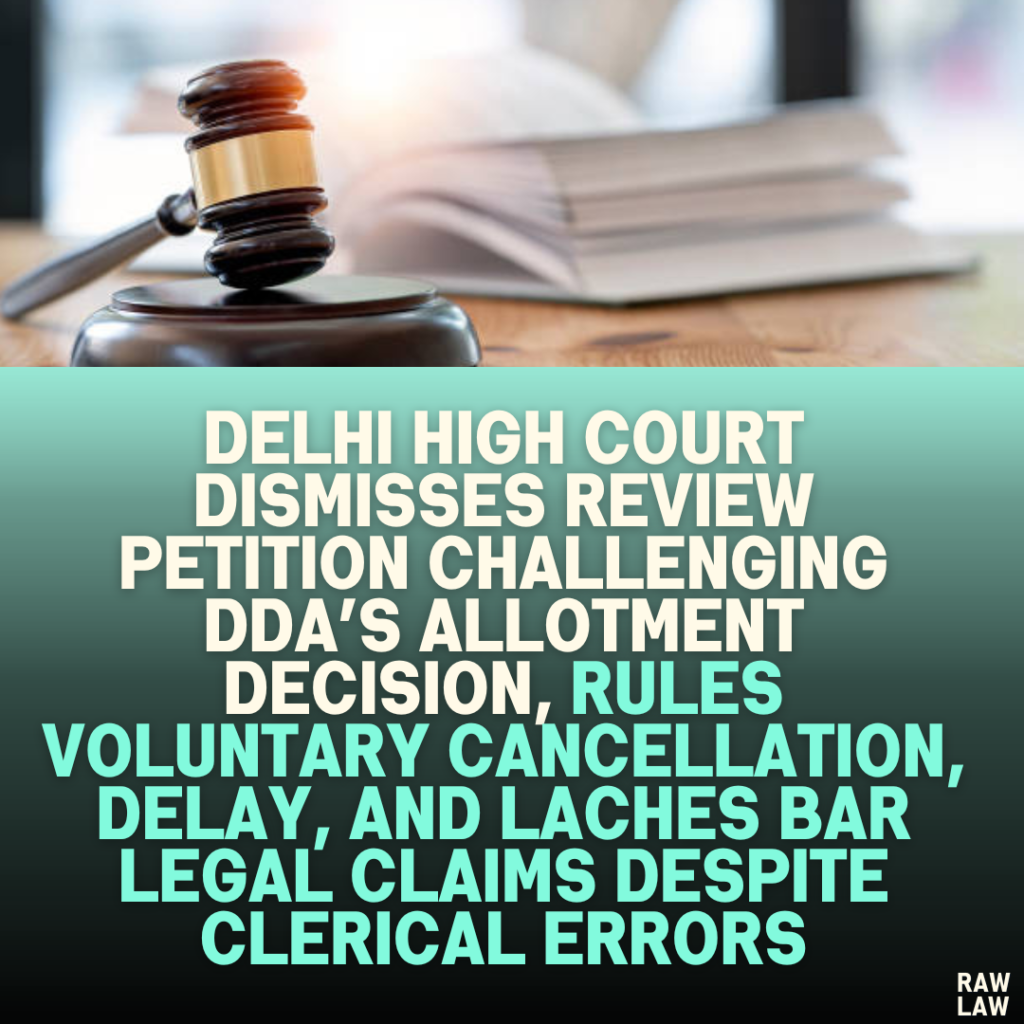Court’s Decision
The Delhi High Court dismissed the review petition filed by the petitioner seeking reconsideration of a previous decision. The court ruled that the petitioner had no legal right to demand allotment of a plot under the 1981 Rohini Residential Scheme (RRS). The court also highlighted that the petitioner had voluntarily canceled his registration and exhibited gross delay in asserting any legal claim. Despite these findings, the court, showing leniency due to the petitioner’s senior citizen status, refrained from imposing any costs on him.
Facts
- Initial Registration: The petitioner applied under the Middle Income Group (MIG) category for the Housing New Registration Scheme, 1976, depositing ₹7,500. This was later transferred to the RRS in 1981.
- Cancellation of Registration: Dissatisfied with the delay in allotment, the petitioner requested cancellation of his registration and refund of the deposited amount in 1991.
- Attempt to Revoke Cancellation: In 2004, the petitioner claimed to have sent a letter withdrawing his cancellation request.
- Inclusion in Draw of Lots: In 2012, the petitioner’s name mistakenly appeared in the draw of lots, but he did not receive any allotment letter. The petitioner claimed this gave him a right to the plot.
- Legal Proceedings: In 2022, after a legal notice to the DDA, the petitioner filed a writ petition. The court dismissed it in 2024, prompting this review petition.
Issues
- Did the petitioner have a legal right to allotment under the scheme?
- Could the DDA’s error in including the petitioner’s name in the draw of lots confer any enforceable rights?
- Did the petitioner meet the grounds for review under the Civil Procedure Code?
Petitioner’s Arguments
- Legal Right to Allotment: The petitioner argued that his name being included in the 2012 draw of lots gave him a right to the plot.
- Improper Service of Notice: He contended that he never received the DDA’s cancellation notice due to its being sent to an incorrect address.
- Failure to Prove Service: The petitioner claimed that the DDA had no proof of serving the cancellation notice and should bear the burden of this error.
- Reliance on Promissory Estoppel: The petitioner argued that the DDA was estopped from denying his claim due to its error.
Respondent’s Arguments (DDA)
- Voluntary Cancellation: The DDA stated that the petitioner voluntarily canceled his registration in 1991, which was duly processed.
- Error in Draw of Lots: The inclusion of the petitioner’s name in the 2012 draw of lots was a clerical mistake and did not confer any legal rights.
- Delay and Laches: The petitioner’s prolonged inaction for decades made his claims stale and untenable.
- No Proof of Withdrawal Letter: The DDA argued that the petitioner failed to prove he withdrew his cancellation request in 2004.
Analysis of the Law
- Limited Grounds for Review: Under Order XLVII Rule 1 of the CPC, review petitions can only be filed on specific grounds: discovery of new evidence, an apparent error on the face of the record, or analogous reasons. The court emphasized that a review is not an appeal or rehearing.
- Doctrine of Promissory Estoppel: The court ruled that this doctrine cannot be used to enforce rights where errors or misunderstandings are evident, especially when the petitioner acted contrary to initial terms.
- Limitation Period: The petitioner failed to act within the prescribed limitation period under the Limitation Act, barring his claims.
Precedent Analysis
- Yamuna Expressway Case (2022): The court cited this case to highlight that promissory estoppel cannot override public interest or equity.
- Central Airmen Selection Board Case (2003): This precedent clarified that errors or misrepresentations do not create enforceable rights.
- Other Cases: The court distinguished the petitioner’s case from earlier decisions where registrations were restored due to procedural fairness or long waiting periods.
Court’s Reasoning
The court outlined several reasons for dismissing the petition:
- Voluntary Cancellation: The petitioner’s own actions in 1991, when he canceled his registration, negated any future claims.
- Delay and Laches: The petitioner waited more than a decade after 1991 to act and again remained silent after 2012 until 2022.
- No Proof of Withdrawal: The petitioner failed to provide evidence of his alleged withdrawal of cancellation in 2004.
- Clerical Mistake in Draw of Lots: The court held that a clerical mistake by the DDA in 2012 did not create any enforceable right for the petitioner.
- Equity and Fairness: Entertaining the petitioner’s claim would prejudice other rightful claimants and undermine the integrity of the allotment process.
Conclusion
The review petition was dismissed as baseless. The court directed the DDA to refund the petitioner’s deposit with 9% interest, considering his senior citizen status. However, it rejected all claims to the plot.
Implications
This judgment reinforces that:
- Legal Rights Must Be Asserted Diligently: Claimants must act within prescribed timelines to avoid their claims being barred by delay.
- Errors in Government Records: Clerical mistakes do not create enforceable rights unless explicitly ratified.
- Equity in Public Policy: Courts prioritize equity and fairness in administrative decisions, particularly in schemes affecting large groups of people.



